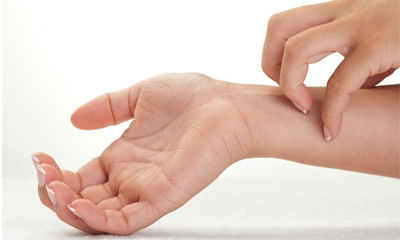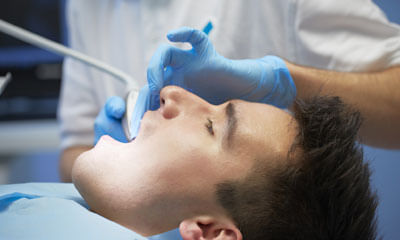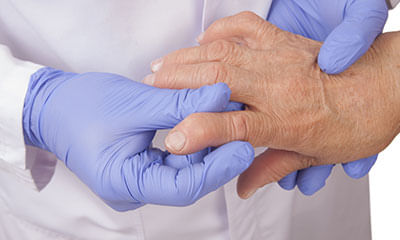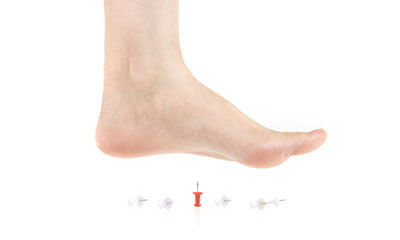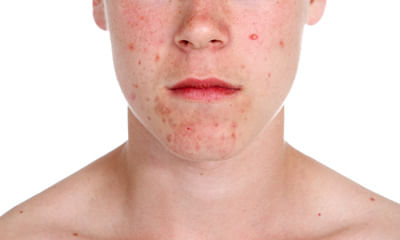Bacterial Skin Infections
I was having yeast infection but was asymptomatic with slight itching first I thought it's uti as I am suffering since o ...
Ask Free Question
Hi, Lybrate user, bacterial vagoasis cause burning, irritation and itching with foul discharge causing recurrence of infection. •wear ,loose under garments to allow fresh air to pass through, nourishing your pelvic, groin and vaginal muscles to check infection.•clean external and internal genital area with underlying homoeopathic medicine. @ echinecea q -20 drops with 1/2 cup of water, apply ,thrice, daily, deep into vagina and vulva, gently. •@take, 10 drops of echineceaq -mixed with 2tsfl of water, thrice, orally. •consult ,privetly for a better and faster recovery, please. •avoid, junk food, alcohol and nicotine. •report after a wk, privetly, please. Tk, care.
Mai 25 saal ka hoo mujhe baar baar muh mein ek jagh par same place pe last teen mahino se challe ho rahe hai kabhi kabhi ...
Ask Free Question
Aapke muh mein baar baar challe hone ke kai karan ho sakte hain. Kuchh karan hain: mouth ulcer: mouth ulcer ek aam samasya hai jo kisi bhi umra ke kisi bhi vyakti ko ho sakti hai. Mouth ulcer ka karan bacteria ya virus ho sakta hai. Mouth ulcer ka ilaj aamतौर par gharelu upcharon se ho jata hai, lekin agar yah baar baar ho raha hai to doctor se consult karna chahie. Lichen planus: lichen planus ek autoimmune disorder hai jo skin aur mouth mein infection ka karan ban sakta hai. Lichen planus ka ilaj doctor ayurvedic dawa ya ointment se kar sakte hain. Candidiasis: candidiasis ek fungal infection hai jo mouth mein infection ka karan ban sakta hai. Candidiasis ka ilaj doctor antifungal dawa se kar sakte hain. Herpes simplex virus: herpes simplex virus ek virus hai jo mouth mein infection ka karan ban sakta hai. Herpes simplex virus ka ilaj doctor antiviral dawa se kar sakte hain. Aapke muh mein challe hone ke karan ko pata karne ke liye aapko doctor se consult karna chahie. Doctor aapke muh ki jaanch karke iske karan ka pata lagaenge aur uske aadhar per sahi ilaaj karenge. Aapke muh mein challe hone se bachne ke liye aapko yeh tips follow karni chahie: healthy diet khayein: healthy diet khaane se aapki immunity strong hoti hai aur aapko infection ka khatra kam hota hai. Mouth hygiene maintain karen: mouth hygiene maintain karne se aapke muh mein bacteria ko grow hone se rok sakte hain. Stress ko manage karen: stress aapki immunity ko weak kar sakta hai aur aapko infection ka khatra badha sakta hai. Agar aapke muh mein challe baar baar ho rahe hain to aapko doctor se consult karna chahie.
I am getting loose motion from past 3 days. I am pooping for about 6-8 times in a day. Sometimes the poop is semi liquid ...
Ask Free Question
The symptoms you're describing, such as frequent loose stools, the presence of mucus, and nausea, can be associated with a variety of gastrointestinal conditions. These could range from infections (like bacterial or viral gastroenteritis) to inflammatory conditions, food intolerances, or other digestive issues. Here are some steps you might consider: stay hydrated: with frequent diarrhea, it's important to stay hydrated. Drink plenty of fluids like water, broth, or oral rehydration solutions. Diet adjustments: eating bland, easy-to-digest foods like bananas, rice, applesauce, and toast can be helpful. Avoid dairy products, fatty foods, high fiber foods, or highly seasoned foods for now. Rest: your body needs energy to fight off whatever is causing your symptoms, so getting plenty of rest is important. Over-the-counter medications: there are over-the-counter medications that can help manage diarrhea, but it's usually best to use these only if absolutely necessary, as your body may need to expel whatever is causing the issue. Seek medical attention: since these symptoms have persisted for several days, it's important to consult with a healthcare provider. They can give you specific advice, conduct tests if needed, and prescribe medication. Avoid self-diagnosis: while it's tempting to try to diagnose the problem yourself, gastrointestinal symptoms can be complex and are best evaluated by a professional. Monitor for dehydration: signs of dehydration include feeling very thirsty, having a dry mouth or skin, urinating less frequently, and dark-colored urine. If you notice these symptoms, it's important to seek medical care.
I am 25 years male I am single and I experiencing a red colour dots on my penis head no itchy but dry I am not done sex ...
Ask Free Question
Red dots on the penis head could be caused by various factors, including infections, allergies, irritation, or other skin conditions. Here are some possibilities: contact dermatitis: this could be caused by an irritant or an allergen. Consider any recent changes in soaps, laundry detergents, or other products that may come into contact with the area. Balantitis: this is an inflammation of the glans (head) of the penis. It can have various causes, including bacterial or fungal infections. Psoriasis or eczema: these are chronic skin conditions that can affect any part of the body, including the genital area. Sexually transmitted infections (stis): even if you haven't had sexual intercourse, some stis can be transmitted through other forms of sexual contact or close personal contact. It's less common, but not impossible. Folliculitis: inflammation of hair follicles can cause red bumps. This can be caused by irritation or bacterial infection. Here are some general recommendations: maintain good hygiene: keep the genital area clean and dry. Use a mild, fragrance-free soap and avoid harsh chemicals. Avoid irritants: if you've recently changed your soap, laundry detergent, or any other products, consider reverting to your previous choices. Stay hydrated: drink plenty of water to promote overall skin health. Avoid sexual contact: until you have consulted with a healthcare professional, it might be a good idea to avoid sexual contact to prevent potential spread. Regards, Dr. Ms. haque.
My mom who is 60y/o is taking 2-3 tea spoons of neem juice along with allopathic medicines to manage her dm t2 (from pas ...
Ask Free Question
Neem juice benefits include blood purification, toxins removal, ulcers, and insect bites treatment. With anti-bacterial traits, it cures burns, infections, and skin problems fast. It destroys those bacteria that pose infections.
Bump in back side of head under hair and very painful. Doctor prescribed zerodol sp for 3 days, completed course but pai ...
Ask Free Question
A boil is a painful and often swollen bump on the skin that results from an infection in a hair follicle or oil gland. Here's some information for boil patients: 1. **Causes:** Boils are typically caused by a bacterial infection, often Staphylococcus aureus. They can occur when bacteria enter the body through small nicks or cuts in the skin. 2. **Symptoms:** Boils usually start as a red, painful lump. Over time, they can become larger, fill with pus, and develop a white or yellow center. They may be surrounded by redness and swelling. 3. **Location:** Boils can appear on any part of the body but are commonly found on the face, neck, armpits, thighs, and buttocks. 4. **Treatment:** Mild boils may resolve on their own. Warm compresses applied to the area several times a day can help speed up the process. In some cases, a healthcare provider may need to drain the boil. They might prescribe antibiotics if the infection is severe or recurrent. 5. **Hygiene:** Keeping the affected area clean and avoiding squeezing or puncturing the boil can prevent complications and further infections. 6. **Pain Relief:** Over-the-counter pain relievers like ibuprofen or acetaminophen can help with the pain and discomfort associated with boils. 7. **Prevention:** Good hygiene practices, such as regular handwashing, can help prevent the spread of bacteria that can lead to boils. Keeping wounds clean and using proper wound care can also reduce the risk. 8. **Recurrent Boils:** If you experience recurrent boils, it may be a sign of an underlying health condition. Consult a healthcare professional for a thorough evaluation. It's important to note that while home care can be appropriate for mild cases, you should seek medical attention if the boil is large, very painful, or accompanied by a high fever, or if you have multiple boils. A healthcare provider can provide proper treatment and guidance for your specific situation.
Hello doctor. I have scalp acne that when it comes out as pustule then pus filled then a crust cover over it which remai ...
Ask Free Question
Scalp folliculitis is a common skin condition in which hair follicles on the scalp become inflamed and infected. It can cause discomfort and sometimes hair loss. Here's some information on scalp folliculitis: 1. **causes:** scalp folliculitis is typically caused by a bacterial or fungal infection. It can also result from friction, irritation, or damage to the hair follicles. 2. **symptoms:** common symptoms include red, itchy or painful bumps on the scalp that may be filled with pus. It can also cause hair loss if left untreated. 3. **types:** there are several types of scalp folliculitis, including: - bacterial folliculitis: often caused by staphylococcus aureus bacteria. - pityrosporum folliculitis: caused by a yeast-like fungus. - eosinophilic folliculitis: associated with hiv infection. - herpetic folliculitis: caused by the herpes simplex virus. 4. **treatment:** the treatment for scalp folliculitis depends on its cause. 5. **prevention:** to prevent scalp folliculitis, practice good scalp hygiene, use gentle hair care products, avoid tight hairstyles, and keep hats and other headgear clean. 6. **consult a professional:** if you have persistent or severe symptoms of scalp folliculitis, consult a dermatologist or healthcare provider for a proper diagnosis and treatment plan. 7. **complications:** if not treated, scalp folliculitis can lead to further infections, scarring, or permanent hair loss. It's essential to address scalp folliculitis promptly to prevent complications and ensure the health of your scalp and hair. Consulting a healthcare professional is recommended for a correct diagnosis and effective treatment.
My tongue is getting white patches and bad smell coming out. Please suggest me what should I do. ...
Ask Free Question
While I understand your concern about the white patches on your tongue and bad breath, I cannot diagnose medical conditions or provide specific medical advice. Experiencing these symptoms might require consultation with a qualified healthcare professional. However, I can offer some general information and suggestions that might be helpful: possible causes of white patches on the tongue and bad breath: oral thrush: this fungal infection, caused by candida albicans, can cause white patches on the tongue and sometimes other areas of the mouth. It often affects individuals with weakened immune systems, who take antibiotics, or have uncontrolled diabetes. Leukoplakia: this precancerous condition appears as white patches on the tongue or other areas of the mouth. While typically harmless, it requires monitoring by a doctor or dentist. Lichen planus: this autoimmune skin condition can also affect the mouth, causing white patches, ulcers, and other symptoms. Poor oral hygiene: brushing and flossing teeth regularly are crucial for maintaining good oral health and preventing bad breath. Dietary factors: certain foods and beverages, like onions, garlic, and coffee, can contribute to bad breath. Smoking: smoking and tobacco use can significantly worsen bad breath and oral health. Tips for managing the symptoms: maintain good oral hygiene: brush your teeth twice daily and floss once a day. Consider using a tongue scraper to remove bacteria and debris from the surface of your tongue. Stay hydrated: drink plenty of water throughout the day to keep your mouth moist and help flush out bacteria. Avoid irritating foods and beverages: minimize your intake of foods and drinks known to contribute to bad breath, like onions, garlic, coffee, and alcohol. Quit smoking: if you smoke, quitting is one of the best things you can do for your overall health and oral hygiene. Recommendations: consult a doctor or dentist: they can examine your tongue and mouth, diagnose the underlying cause of your symptoms, and recommend appropriate treatment. Practice good oral hygiene habits: following proper brushing, flossing, and tongue cleaning practices is essential for maintaining good oral health and preventing future problems. Maintain a healthy lifestyle: eating a balanced diet, getting regular exercise, and managing stress can all contribute to good oral health and overall well-being. Remember, seeking professional medical advice is crucial for understanding the cause of your white patches and bad breath, receiving proper treatment, and maintaining good oral health. Don't hesitate to schedule consultations with relevant healthcare professionals to address your concerns and improve your well-being. I hope this information is helpful and encourages you to prioritize your health by seeking professional assistance.
What cream is best for balanitis he have inflammation and redness on foreskin and smegma uder the foreskinhow can treat ...
Ask Free Question
Clotrimazole and miconazole are antifungal creams commonly used to treat fungal infections, including those that can cause balanitis. These creams work by inhibiting the growth of fungi and reducing inflammation. They are typically applied topically to the affected area two to three times a day for a specified duration as directed by a healthcare professional. In addition to using topical creams, practicing good hygiene is crucial in managing balanitis. Here are some general tips: 1. Gentle cleansing: wash the penis gently with warm water and mild soap, ensuring that all smegma is removed. Avoid using harsh soaps or cleansers that may further irritate the area. 2. Drying: after washing, pat the area dry with a clean towel. Moisture can contribute to the growth of bacteria or fungi, so it is important to keep the area dry. 3. Avoid irritants: refrain from using scented soaps, lotions, or other products that may contain chemicals that can irritate the sensitive skin of the penis. 4. Loose-fitting clothing: wear loose-fitting underwear made of breathable fabrics to allow air circulation and minimize moisture buildup. 5. Safe sexual practices: if balanitis is caused by a sexually transmitted infection (sti), it is essential to practice safe sex and seek appropriate treatment for both partners. It is important to note that while creams can provide relief for mild cases of balanitis, more severe or persistent cases may require additional medical intervention. In such case, you can consult me directly to evaluate your symptoms in detail and provide personalised advice.
Hi doctor's, my scrotum are sagging from past 1 year and a thick, lumpy discharge is forming I keep cleaning everyday bu ...
Ask Free Question
There can be various reasons for sagging of the scrotum and the presence of a thick, lumpy discharge. Some possible causes include: 1. Testicular atrophy: this refers to the shrinking of the testicles, which can lead to sagging of the scrotum. Testicular atrophy can be caused by factors such as hormonal imbalances, certain medications, infections, or underlying medical conditions. 2. Epididymitis: this is the inflammation of the epididymis, a coiled tube located behind each testicle that stores and carries sperm. Epididymitis can cause swelling, pain, and a thick discharge from the penis. It is commonly caused by bacterial infections, but can also be due to viral infections or other factors. 3. Hydrocele: a hydrocele occurs when fluid accumulates in the sac around the testicle, causing swelling and sagging of the scrotum. While hydroceles are usually painless, they can sometimes be associated with discomfort or a heavy feeling in the scrotum. 4. Sexually transmitted infections (stis): certain stis like gonorrhea or chlamydia can cause symptoms such as discharge from the penis and discomfort in the scrotum. It is important to get tested if you suspect an sti as they require proper medical treatment. 5. Varicocele: this condition involves enlarged veins within the scrotum, similar to varicose veins in the legs. Varicoceles can cause sagging of the scrotum and may be associated with discomfort or pain. 6. Other factors: there are other potential causes for scrotal sagging and discharge, including skin infections, allergies, dermatitis, or even certain types of cancer. However, these are less common and would require a thorough evaluation. Given the complexity of your symptoms, it is crucial to seek medical attention. You can consult me to conduct a physical examination, review your medical history, and may order additional tests such as blood test, urine analysis.

